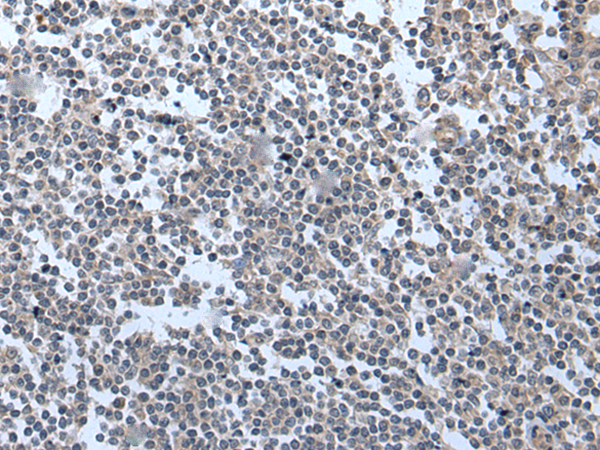
| WB | 咨询技术 | Human,Mouse,Rat |
| IF | 咨询技术 | Human,Mouse,Rat |
| IHC | 1/25-1/50 | Human,Mouse,Rat |
| ICC | 技术咨询 | Human,Mouse,Rat |
| FCM | 咨询技术 | Human,Mouse,Rat |
| Elisa | 1/2000-1/5000 | Human,Mouse,Rat |
| Aliases | PCP; TLD; OI13; PCP2; PCOLC |
| Host/Isotype | Rabbit IgG |
| Antibody Type | Primary antibody |
| Storage | Store at 4°C short term. Aliquot and store at -20°C long term. Avoid freeze/thaw cycles. |
| Species Reactivity | Human, Mouse |
| Immunogen | Synthetic peptide of human BMP1 |
| Formulation | Purified antibody in PBS with 0.05% sodium azide and 50% glycerol. |
+ +
以下是关于CCL22抗体的3篇参考文献及其简要摘要:
1. **文献名称**:*CCL22 controls immunity by regulating regulatory T cell activity and tumor infiltration*
**作者**:Curiel TJ et al.
**摘要**:该研究揭示了CCL22在肿瘤微环境中通过招募调节性T细胞(Tregs)促进免疫抑制,并开发了一种抗CCL22单克隆抗体。实验表明,阻断CCL22可减少Tregs浸润并增强抗肿瘤免疫反应。
2. **文献名称**:*Targeting the CCL22–CCR4 axis with monoclonal antibodies in autoimmune disease models*
**作者**:Yoshie O, Imai T.
**摘要**:文章探讨了抗CCL22抗体在自身免疫疾病中的治疗潜力,证明其能抑制CCL22与受体CCR4的结合,从而减少致病性T细胞迁移,缓解小鼠模型中的炎症反应。
3. **文献名称**:*CCL22 as a biomarker in cancer: Expression profiling and antibody-based detection*
**作者**:Weber JS et al.
**摘要**:该研究通过免疫组化和ELISA技术,验证了CCL22在多种癌症组织中的高表达,并开发了一种高特异性抗CCL22抗体用于临床样本检测,提示其作为预后标志物的潜力。
如需具体文献来源(期刊、年份等),可进一步补充说明。
CCL22 (C-C motif chemokine ligand 22), also known as macrophage-derived chemokine (MDC) or STCP-1. is a small cytokine belonging to the CC chemokine family. It is primarily produced by dendritic cells, macrophages, and certain epithelial or tumor cells. CCL22 binds to the CCR4 receptor, playing a key role in recruiting immune cells like Th2 lymphocytes and regulatory T cells (Tregs), thereby modulating immune responses. Its involvement in immune regulation makes it a critical player in pathologies such as allergies, autoimmune diseases, and cancer. In tumor microenvironments, CCL22 overexpression often correlates with Treg infiltration, contributing to immunosuppression and tumor progression.
CCL22 antibodies are tools designed to detect, quantify, or neutralize CCL22 in experimental or therapeutic contexts. They are widely used in research to study CCL22's biological functions, signaling pathways, and its role in disease mechanisms. These antibodies (monoclonal or polyclonal) are validated for applications like ELISA, Western blotting, immunohistochemistry, and flow cytometry. Specificity and sensitivity are critical for distinguishing CCL22 from homologous chemokines. Therapeutic CCL22-neutralizing antibodies are under exploration to block the CCL22/CCR4 axis, aiming to counteract immunosuppression in cancers or inflammatory conditions. Validation via knockout controls or functional assays (e.g., chemotaxis inhibition) ensures antibody reliability. Understanding CCL22-antibody interactions also supports biomarker discovery and drug development targeting chemokine-mediated immune evasion.
×